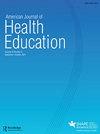健康教育的系统评价与元分析
IF 0.8
Q4 PUBLIC, ENVIRONMENTAL & OCCUPATIONAL HEALTH
引用次数: 0
摘要
我很高兴向大家介绍《美国健康教育杂志》(AJHE)关于健康教育中的系统评价和荟萃分析的特刊。本期特刊的目的是通过系统综述和荟萃分析,深入了解健康教育中的重要主题,促进健康教育专业的发展。系统综述和荟萃分析通过对特定主题的研究进行全面综合,在健康教育实践中发挥着重要作用。遵循严格方法论实践的系统审查和荟萃分析可以为当前影响个人、社区和社会健康的问题提供令人信服的证据。此外,AJHE的任务是发表研究手稿,重点关注健康教育和健康促进干预措施,旨在预防或延迟影响人口健康的主要慢性病和疾病的发作。系统审查和荟萃分析可以帮助确定可能需要或改进健康教育/健康促进干预的人群、地点、结果和条件。特刊包括六篇关于一系列主题的文章,包括体育活动、心理健康、酒精滥用、糖尿病、慢性阻塞性肺病和口腔健康。探讨了不同的行为、地理区域、理论和干预方式,包括学生主导和自我管理。大多数作者使用了系统评价和荟萃分析的首选报告项目(PRISMA)指南,这是系统评价和元分析中报告证据的公认标准。我认为每一位认证的健康教育专家和健康教育家都会在这些文章中找到一些有价值和专业兴趣的东西。Bopp、Vadeboncoeur、Roetert和Stellefson对一个日益重要和相关性的术语进行了有趣的文献综述;体育素养。他们概述了在美国发表的关于该主题的文献,并强调了讨论该主题的学者、学科和不同研究的背景。它全面概述了体育素养的演变,并对体育素养在健康教育行业及其他领域的未来影响进行了有价值的讨论。Delfin、Gray和Wilkerson对精英运动员心理健康干预的文献进行了系统综述。他们概述了与该主题和人群相关的研究,包括年份、原籍国、特定目标人群、研究目的、研究设计、干预组、干预持续时间、干预活动、心理健康结果测量和干预效果。此外,他们还回顾了当前研究的方法论质量。在最近几名学生运动员自杀身亡后,人们对大学体育运动中的心理健康越来越担忧,我发现这项研究尤其重要。Stellefson、Kinder、Boyd、Elijah、Naher和McFadden通过审查向农村地区患有慢性阻塞性肺病的成年人提供的自我管理干预措施,为特刊增添了内容。更具体地说,他们比较了远程医疗和非远程医疗干预措施,并总结了干预设计的研究,包括使用的策略、长度和交付类型;理论运用;参与者和设置;研究设计;以及研究结果。在新冠肺炎大流行期间,远程医疗越来越受欢迎,因此本文献综述的及时性是适当的。Moore、Turner、Stellefson和Chaney使用基于理论的问卷对研究进行了系统总结,以评估年轻人口腔卫生行为的预测因素。他们专注于计划行为理论,并在强调影响牙科行为意向的干预措施方面做得令人难以置信。鉴于口腔疾病通常是慢性疾病,并且口腔健康与其他慢性疾病之间存在着既定的关系,这是一篇重要的文献综述。Nickelson、McFadden、Johnson和Boucher研究了与学生提供的糖尿病健康结果干预相关的文献。他们假定那个学生-本文章由计算机程序翻译,如有差异,请以英文原文为准。
Systematic Reviews and Meta-Analyses within Health Education
I am excited to introduce a Special Issue of the American Journal of Health Education (AJHE) on Systematic Reviews and Meta-Analyses within Health Education. The purpose of this special issue was to provide indepth understanding on important topics in health education through systematic reviews and meta-analyses that advance the health education profession. Systematic reviews and meta-analyses have an important role in health education practice by providing comprehensive syntheses of research on specific topics. Systematic reviews and meta-analyses that follow rigorous methodological practices can provide compelling evidence regarding issues currently impacting the health of individuals, communities, and societies. Furthermore, AJHE’s mission is to publish research manuscripts that focus on Health Education and Health Promotion interventions designed to prevent or delay the onset of the major chronic diseases and illnesses that impact population health. Systematic reviews and meta-analyses can assist in identifying populations, places, outcomes, and conditions where a health education/health promotion intervention might be needed or improved. The special issue comprises six articles on an array of topics including physical activity, mental health, alcohol misuse and abuse, diabetes, COPD, and oral health. Different behaviors, geographic regions, theories, and intervention styles including student-led and selfmanagement are explored. Most authors utilized the Preferred Reporting Items for Systematic Reviews and Meta-Analyses (PRISMA) guidelines which is the recognized standard for reporting evidence in systematic reviews and meta-analyses. I think every Certified Health Education Specialist and Health Educator will find something of value and professional interest within these articles. Bopp, Vadeboncoeur, Roetert, & Stellefson provide an interesting literature review on a term growing in importance and relevance; physical literacy. They provide an overview of the literature published in the United States on this topic and highlight the scholars, disciplines, and contexts for different studies discussing the topic. It provides a comprehensive overview of the evolution of physical literacy in addition to a valuable discussion on the future implications of physical literacy in the health education profession and beyond. Delfin, Gray, & Wilkerson conducted a systematic review of the literature on mental health interventions for elite athletes. They provided an overview of research related to this topic and population including year, country of origin, specific target population, study purpose, study design, intervention groups, intervention duration, intervention activities, mental health outcome measures, and intervention effects. Additionally, they reviewed the methodological quality of the current research. I found this research particularly relevant given the growing concerns over mental wellness gripping college athletics after the recent deaths of several student-athletes by suicide. Stellefson, Kinder, Boyd, Elijah, Naher, & McFadden added to the special issue by reviewing self-management interventions delivered to adults with COPD in rural areas. More specifically, they compared telehealth and non-telehealth interventions and summarized the research on intervention design including tactics utilized, length, and delivery types; use of theory; participants and setting; study design; and study outcomes. Telehealth grew in popularity during the COVID-19 pandemic, so the timeliness of this literature review is appropriate. Moore, Turner, Stellefson, & Chaney systematically summarized research studies using theory-based questionnaires to assess predictive factors of oral hygiene behaviors among young adults. They focused on the Theory of Planned Behavior and do an incredible job of highlighting interventions that influence intention to engage in dental behaviors. Given that oral diseases are often chronic and there is an established relationship between oral health and other chronic diseases, this is an important literature review to read. Nickelson, McFadden, Johnson, & Boucher examined literature related to student-delivered interventions on diabetes health outcomes. They postulate that student-
求助全文
通过发布文献求助,成功后即可免费获取论文全文。
去求助
来源期刊

American Journal of Health Education
PUBLIC, ENVIRONMENTAL & OCCUPATIONAL HEALTH-
CiteScore
1.70
自引率
10.00%
发文量
36
期刊介绍:
AJHE is sponsored by the American Association for Health Education of the American Alliance for Health, Physical Education, Recreation and Dance. The mission of the American Association for Health Education(AAHE) is to advance the profession by serving health educators and others who strive to promote the health of all people through education and other systematic strategies.AAHE addresses the following priorities •Develop and promulgate standards, resources and services regarding health education to professionals and non-professionals •Foster the development of national research priorities in health education and promotion. Provide mechanisms for the translation and interaction between theory, research and practice.
 求助内容:
求助内容: 应助结果提醒方式:
应助结果提醒方式:


